17
SepGrab Deal : Upto 30% off on live classes + 2 free self-paced courses - SCHEDULE CALL
DevOps expertise is in great demand more than ever. Job posting with “DevOps” in a title is sprouting up everywhere at a mushroom growth speed. If you will search it on Linkedin, Dice, or even your social media, you will find how the term “DevOps” is massively stacked everywhere. The urgent & surpassing demand than the availability of DevOps practitioners has made it the highest paid job in IT.
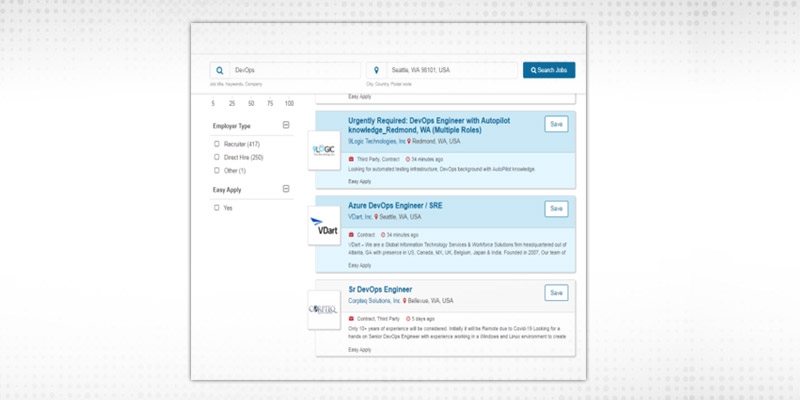
Many of you must be wondering if “DevOps is a great career path at all or not”. Well, thinking such a way is natural as you have always perceived DevOps as just a flourishing IT philosophy, which can transform an enterprise’s ability to deliver applications and services at a cost-effective & faster pace and scale.
Yes, no doubt DevOps is a philosophy, set of tools, a method of syncing operations with development, but it is also a role, a role that requires diligent people to simplify any organization’s software development to the delivery stage.
Not sure about DevOps as a career path? Don’t worry, In the following article, we are going to press upon why and how to learn DevOps online, but before that let’s have a brief understanding of what DevOps is, who are DevOps professionals, and what technical to soft skills they need.
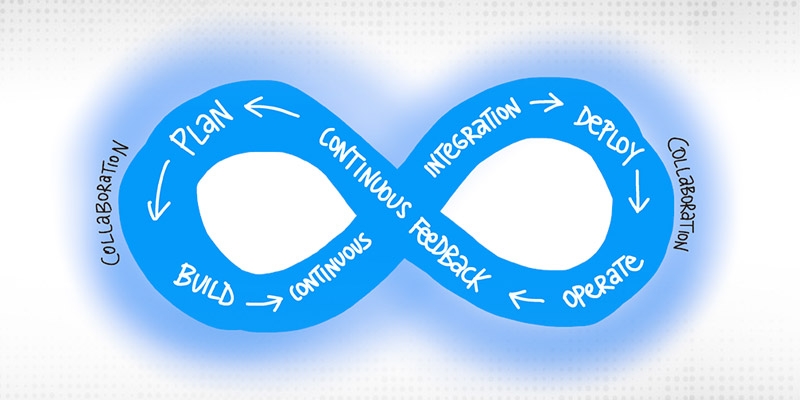 DevOps is a modern age philosophy or strategy that narrows down the bridge between the IT staff and the developer peeps.
DevOps is a modern age philosophy or strategy that narrows down the bridge between the IT staff and the developer peeps.
“DevOps is a way to develop & deliver software fast but with shared pain and responsibility”.
Traditionally the developers (the ones who develop the software) used to work distantly from the operations team (the people who run the software) --- which was quite taxing, huge time & cost consuming, caused new-feature development to take years to approve & implement.
Due to the misalignment between the development and operations team, the term DevOps was evolved - that broke down the silos mentality and combined the two separate branches of SDLC for real good. The DevOps guy helps to reunite the developers & IT teams tasks, responsibility, and efforts towards a common goal “that is to develop & deploy customer-centric software fast & cost-effectively.
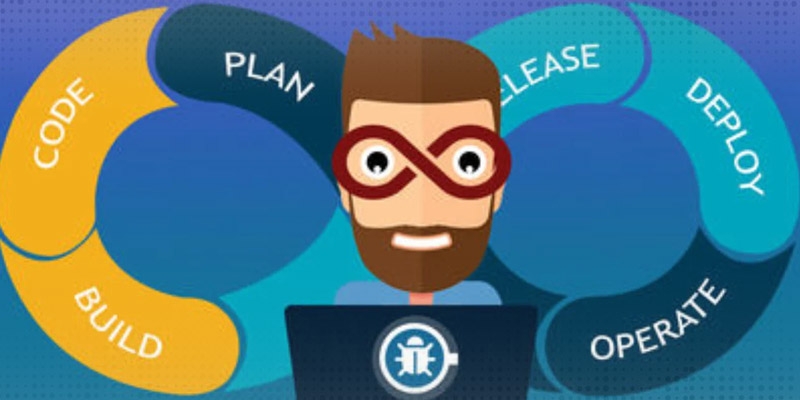
DevOps Engineer is basically someone who understands the software development lifecycle and has explicit knowledge of diverse automation tools for developing the Continuous Integration (CI)/Continuous Deployment (CD) pipelines.
“Hey, it still doesn’t answer who is a DevOps engineer?”
DevOps engineers are professionals within a team that works in coordination with the “Developers” and “IT” staff to oversee the fast & effective code releases. He/she has some good knowledge of the Software Development Lifecycle and can integrate the right software engineering tools and processes to solve classic operations challenges.
Here are the popular DevOps tools these engineers use:
A DevOps engineer has to know about the use & implementation of the above DevOps tools to automate the organization’s existing/new manual build and deployment processes.
DevOps is a very valuable asset for today’s organizations as it gives measurable benefits through continuous integration and continuous delivery --- without compromising the quality of the business’s technical products and services.
“Gives Faster Delivery Times & Improves Customer Experience and Satisfaction”
DevOps with the application of Agile principles smoothens the collaboration between Development and Ops to fasten the development cycles and keep great control over costs, quality, and timelines of the product for the end-customers.
DevOps Training & Certification Course

“Breaks down the Silos mentality”
DevOps breaks down the barriers (as a general lack of collaboration, unnecessary/ambiguous work) between development and IT staff to create a cross-functional cooperation team --- that is composed of all the experts responsible for developing the delivery process and contributing to reliable and stable end-outputs faster.
“Help detects the defects/bugs or performance lapses at tide’s speed”
“Defects/downtime are any app’s enemy in the application economy”.
With DevOps collaboration, iterative development, and modular programming, it gets easy to pick up and treat the code defects in the shortest timeline --- which enable producing & releasing of only reliable and efficient products to end-users.
Reports say that with DevOps:
“Development cycles are fast”
With enhanced collaboration and shareability of responsibility between the teams, the wasteful & redundant development tasks are eliminated, and the only effective ones are processed --- which results in the faster development cycle of a software/application.
“Continuous Integration (CI), Continuous Delivery (CD), Testing, and Monitoring”
CI & CD pipelines are integral parts of the continuous deployment process which ensures that the changes are releasable. Which automates the release process and fastens the organization’s product time to market.
And the continuous testing and monitoring help to timely check the validation of built application functions & performance.
DevOps Training & Certification Course

DevOps engineers are required to possess certain inherent technical to personality skills before joining any organization. Let’s find out what they are.
Automation is the core of DevOps.
As a DevOps engineer, you must know how to automate the complete DevOps pipeline, inclusive of:
Automation is the core of DevOps because it allows reducing the human intervention to foster great speed, accuracy, reliability, security, consistency while cutting the number of errors. Eventually, automating the processes results in more quick, swift, and higher-quality delivery of software & its value to the end-customers.
Note Your capacity to automate processes & tasks depends largely on your knowledge around DevOps tools and scripting skills.
Knowing to code is not a fixed prerequisite for the DevOps professionals. But it is something that is recommended to the professionals to have.
Since DevOps professionals will be working in collaboration with the developers & technical, they need to have a tight hold on programming languages to meet the technical challenges or automation tasks seamlessly. Though DevOps professionals don’t write code line by line, but still you can learn languages like Python, Java, Bash, Shell.
If you are confused about which one to learn --- start with Python --- as it is the most widely accepted language we have today.
DevOps is greatly impacted by how effective testing is done in the organization. You simply cannot automate the DevOps pipeline if the efficient continuous testing (which is the process of doing automated tests) is not in place.
As a DevOps engineer, your role would be to ensure that every automated test is running as it should --- by having great knowledge around automation testing tools & processes.
No doubt DevOps helps to develop and to release software faster, but with that, it also creates a bunch of vulnerabilities, bugs, and malware - which needs to be addressed on a constant basis.
DevOps professionals need to have the basics to advance software security skills to be able to introduce security into the SDLC effortlessly and at faster strides.
DevOps professionals need to have strong & convincing communication & collaboration skills as:
Since DevOps professionals role surrounds people, the teams of developers & IT staff, the customers, the management ---- all with different emotional levels ----DevOps engineers need to have great empathy and usefulness to understand people’s feelings and put it above all.
As a DevOps engineer, you need to understand the motive and conscience of all the people working within the organization, without creating any contention point or constraints.
DevOps people need to have great skills to understand the needs and requirements of business clients or customers -- being able to walk in their shoes.
They should have the anticipation of what tangible results and value the customers are seeking or what ways could be adopted to help the organization add & deliver more value through products.
They should keep thorough touch & understanding with the key stakeholders, including developers, testers, project managers, and business leaders --- so that activities can be better optimized and synchronized to deliver complete promises to the customers.
These are the basic skills that every DevOps engineer needs to have ingrained. Now let’s come to your most asked queries “why to learn DevOps Online” or “Is DevOps a good career?” --- let’s find out all!
Here are the reasons that will compel you why you should learn DevOps online, obtain the competent certification, and look for career opportunities within it.
As per Glassdoor, the DevOps professionals can earn an average package between $137,000 and $180,000 per year.
DevOps Engineers Average Salary Based on the level of experience:
Based on analysis across 65 U.S cities:
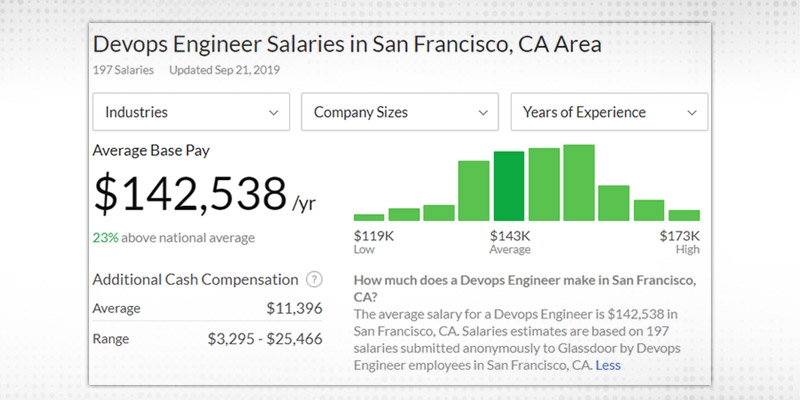
According to an SD Times report --- the role of DevOps Engineer has seen a 225% jump in postings on the famous job portal Indeed. Also, the title DevOps engineers rank on the second position in the glassdoor’s list of “America’s 50 Best Jobs”.
As per Indeed, here are the States and their number of requirements for DevOps professionals.
|
States |
Number of DevOps Jobs |
|
Washington DC |
1175 |
|
California |
2644 |
|
Texas |
877 |
|
Virginia |
1302 |
|
Illinois |
561 |
|
Washington |
759 |
DevOps has a scope & penetration beyond pure tech industries. You can explore your DevOps career equally in the following industries.
Banking industry
The banking industry realized the essence of using DevOps to drive their competency and customer satisfaction. And brands like:
Insurance sectors have as well taken inroads to DevOps practices as they realized they too have apps on release to suit customers’ needs.
DevOps in healthcare industries has been helping them make more use of automation of repeatable practices to strike out manual labor and is helping make more effective use of big data (from electronic health records (EHR) to patient images) --- to make better decisions within the organization.
The collaboration between teams due to DevOps is helping with the effective treatment of sensitive data and increased ability to maintain compliance.
Hospitality
With DevOps, the hospitality brands are getting well-equipped to meet guests’ changing needs and are able to better deliver to their needs conveniently through systemized applications.
Rather than exploring the core tech industry, you can explore any of the above industries too based on interest preferences.
DevOps Training & Certification Course

Demand for DevOps is great as these top magnets are incessantly hiring for skilled & certified DevOps professionals.
The requirement of DevOps roles is pretty huge in almost every small to medium to large scale company - as DevOps is more effective & efficient than traditional development.
“Even if you will search for your dream company, you will surely find the DevOps jobs there”.
No, you are not just going to get titled with “DevOps professional or engineer”, you can get the title as the following too --- all depending on the areas of your interest:
These are the benefits you will get if you will learn DevOps online, now let’s look at how to learn Devops at home or from anywhere and still get formal training to acquire the DevOps certification.
Here are the quick ways on how to learn DevOps at home or anywhere else remotely to get the formal education required for certification & job specific learnings.
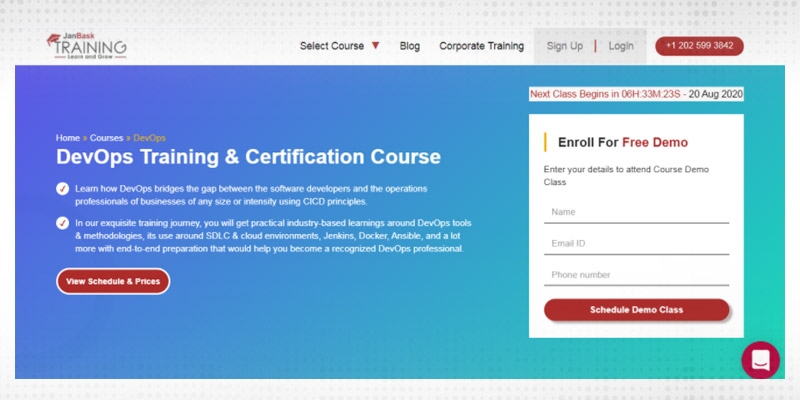
To get end-to-end learnings of DevOps discipline to qualify certification & job-related aspects, it is best to join a professional & accredited DevOps training program online that has:
Once done with the training, you will have every knowledge required to clear the certifications and how to apply for them, so apply that knowledge to clear the certification from any of like:
Why become a certified DevOps professional? They validate your skills & expertise and can help you jump in salary than those who aren't certified.
Once you qualify for the certification exam, the best way to absorb within the full-time job role at entry-level is to start working on the projects or take an internship. Either of two will give you a headstart of the real-work industry and give you a structured knowledge of how real-time industry works. And doing this will also help you build a portfolio that you can show during the interview process of full-time jobs to get compensated really well.
We just wrapped up understanding three core things --- a background of DevOps professionals (who they are, what skills they need to know), why to learn DevOps online, how to learn Devops at home.
DevOps is an in-demand skill that every small to large scale company is fondly looking for. DevOps without a doubt is a highly compensated, satisfactory, and growing job profile to be in. Also, people who are switching careers or just beginning in their professional front can opt for this field without much difficulty.
The DevOps concept was built to simplify, fasten, and quality-rich the software development to the delivery stage, and as long as industries/enterprises are in the business of making customer-centric software solutions, they will need DevOps dudes to synchronize and streamline their operations and development tasks, teams, tools.
So, still, wondering why DevOps certification or career? How would a quick and free demo class do?
 Pinterest
Pinterest
 Email
Email
The JanBask Training Team includes certified professionals and expert writers dedicated to helping learners navigate their career journeys in QA, Cybersecurity, Salesforce, and more. Each article is carefully researched and reviewed to ensure quality and relevance.

Cyber Security

QA

Salesforce

Business Analyst

MS SQL Server

Data Science

DevOps

Hadoop

Python

Artificial Intelligence

Machine Learning

Tableau
Search Posts
Related Posts
Top 10 DevOps Practices, You Should Consider for Perfect Results!
![]() 844.7k
844.7k
A Starter Guide to Jenkins Cheat Sheet you Need to Know
![]() 9.1k
9.1k
20 Dynamic DevOps Tools for Effortless Infrastructure Automation and Monitoring
![]() 3.2k
3.2k
Popular Tenets to Learn DevOps
![]() 618.1k
618.1k
4 Easy and Famous Ways To Facilitate Jenkins Management
![]() 5.3k
5.3k
Receive Latest Materials and Offers on DevOps Course
Interviews